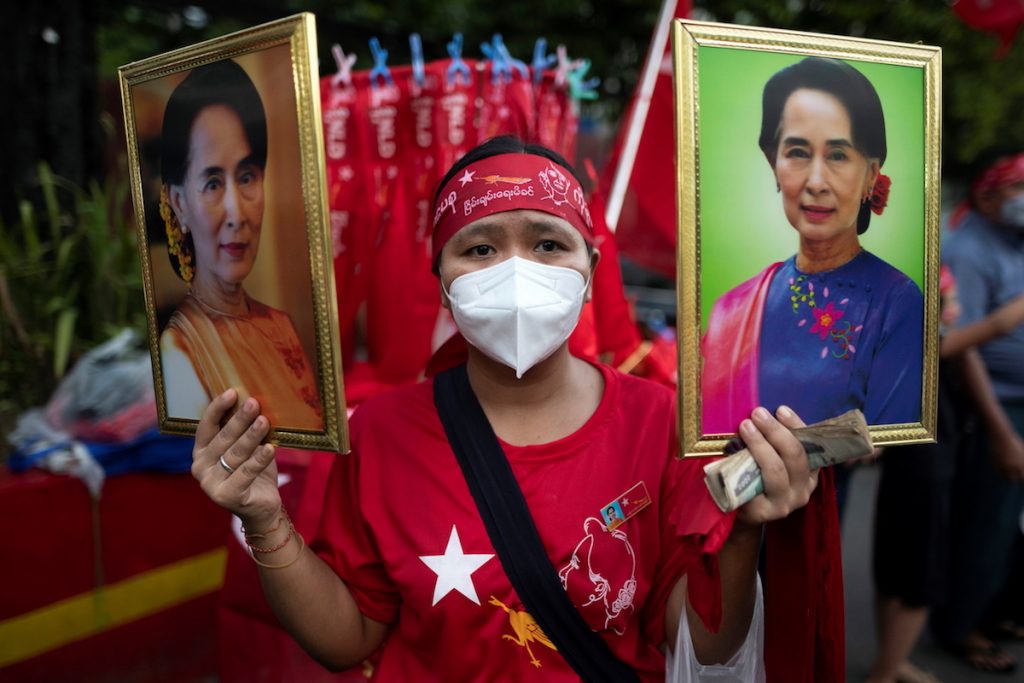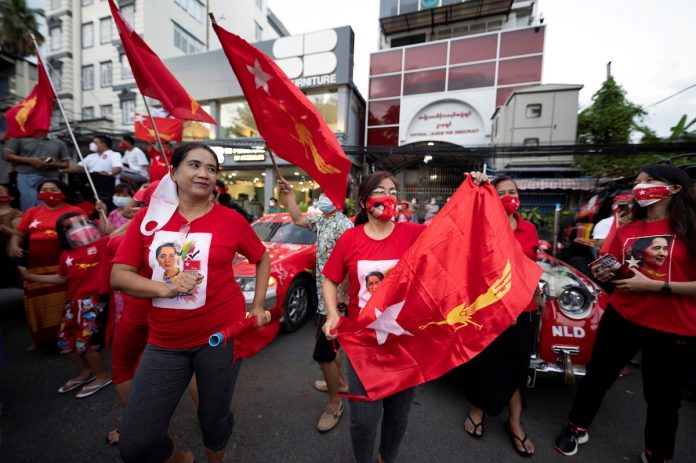Myanmar’s ruling party claimed a resounding victory on Oct. 9 in the second parliamentary election since the end of strict military rule, based on its own unofficial tally of votes.
The Oct. 8 election was viewed as a referendum on the fledgling democratic government led by Aung San Suu Kyi and her National League for Democracy (NLD), which remains very popular at home but has seen its overseas reputation battered by accusations of genocide against the Rohingya Muslim minority.
NLD spokesman Myo Nyunt told Reuters it had won many more than the 322 seats in parliament needed to form a government, based on data compiled from reports by party agents at polling stations nationwide, though he gave no specific estimate.
“For the people, for the party, this is such an encouraging election result,” he said, adding that the NLD expected to exceed the total of 390 seats it took in its 2015 landslide win.
The Election Commission had been expected to release results on Oct. 10 but had only published a handful by the evening, as candidates and parties posted their own data online.
Up for grabs were 315 seats in the 425-member lower house and 161 seats in the 217-seat upper house of parliament.
A spokesman for the second biggest party, the military-backed Union Solidarity and Development Party (USDP), could not immediately be reached for comment.
The European Union and Britain commended Myanmar for the vote but criticised the disenfranchisement of more than a million voters, including hundreds of thousands of Rohingya Muslims in Rakhine state.
U.S. Secretary of State Mike Pompeo said the polls marked an important step in Myanmar’s democratic transition, although Washington had concerns about the large number of seats reserved for the military and the disfranchisement of groups including the Rohingya.
In a statement, he also expressed concern about the cancellation of voting in parts of several states and regions and the disqualification of candidates “based on arbitrary application of citizenship and residency requirements”.
Pompeo said Washington would continue to monitor Myanmar’s electoral process closely and called for tabulation of votes and resolution of complaints to be undertaken “in a transparent and credible manner”.

Some unable to vote
The military, which ruled Myanmar for nearly 50 years until it began withdrawing from civilian politics in 2011, controls a quarter of seats in both houses of parliament under a constitution it drew up and which Suu Kyi wants to amend.
The NLD had been expected to win but with a smaller margin following the emergence of new parties and ethnic minority parties gaining support in some regions.
Political analyst Yan Myo Thein said early results showed ethnic parties had won some seats in Kayah, Mon and Shan states, where many people harbor grievances against the central government, but the overall picture was of another NLD landslide.
The results, he said, “show that the majority of people don’t want…the involvement of the military in politics and the majority of people still continue to recognize and support Aung San Suu Kyi, the leader of the NLD, as their leader.”
In contrast to the wave of optimism that greeted the NLD’s 2015 win, Myanmar held this election amid a surge in COVID-19 infections, economic hardships and escalating ethnic conflicts.
More than a million people were unable to vote after polls were cancelled due to insurgencies.
In Rakhine State, where Rohingya Muslims are confined to camps and villages and mostly denied the vote because they are not citizens, the vast majority of polling stations were closed due to fighting between government troops and ethnic insurgents.
Myo Kyaw, general secretary of the Arakan League for Democracy (ALD), said the Rakhine nationalist Arakan National Party (ANP) had won most seats contested in the state.
The Democracy and Human Rights Party, a Rohingya party, said it was “utterly disappointed” that its people had been disenfranchised.
The government does not consider most Rohingya Myanmar citizens but instead migrants from neighboring Bangladesh, even though many can trace family roots back many generations.
The United Nations has said there was genocidal intent in a 2017 army crackdown that forced 730,000 Rohingya to flee to Bangladesh. Myanmar says its security forces were carrying out legitimate operations against Rohingya militants.









